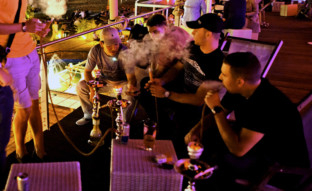
Dubai: A hall filled with skimpily dressed guests listening to live music while smoking shisha and enjoying an array of lavish food. Are we talking of a night club? No, this is a description of one of Dubai’s many Ramadan tents.
The month of Ramadan is the one month of the year solely dedicated to worship and self-reflection.
However, with the emergence of lavish Ramadan tents in the UAE, many observe that some Muslims — especially the youth — are forgetting its essence by focusing more on which trendy tent to go to rather than dedicating time to worship.
Mai Jameel, a stay-at-home mother of three, says her 20-year-old nephew would rush through his prayers to catch up with his friends at the tent.
“I don’t think I am an old-fashioned person, and I don’t think that there is anything wrong with having iftar or suhour at a nice restaurant, but when these tents show what Ramadan is about among the youth, that is when we have a problem,” she said.
Mai said tents are competing with each other to become more appealing to the youth by adding live music, shisha and card games, which also moves the youth away from the spirit of Ramadan.
Mohammad Basel, who works in the advertising sector, believes everything should be done in moderation.
“God did not say, ‘Don’t go to [iftar] tents, but we should dedicate time for Him as well. If you pray, reflect and read the Quran, it’s fine to go out with your friends for suhour at night. You should balance everything,” he said.
University student Mona Qadoumi, on the other hand, believes it is the way people dress when attendng these events which makes her feel people are forgetting the essenceof the month.
“It’s like they are going to a wedding. Full make-up, high heels and inappropriate clothing. I think of Ramadan as a month spent with the family. But other youth think of it as a time to dress up and socialise.”
Mona also believes that by going to expensive and extravagantly rigged up tents — which can cost around Dh190 to Dh350 per person — not only are people wasting money, they are also missing out on the point of fasting, which is to feel for those who are underprivileged.
“We are blessed to live in the UAE, so I think we should use this month to thank god for all the riches we have.”
Meanwhile, Ramadan tents are trying to respect the holy month by urging their guests to dress conservatively.
Upon booking a table at Jumeirah Beach Hotel’s Majlis Al Safina tent, an SMS confirming the booking says that the dress code is conservative.
Other tents, including Majlis Al Safina and Asateer in Atlantis, even give out shawls to those not dressed appropriately.
Gulf News tried to contact a number of Dubai tents but they did not want to comment on the topic.
However, when it came to booking a table at any one of the dozens of iftar tents, the majority said that they are fully booked, especially during the weekend, clearly pointing to the fact that there is a big demand for them.












